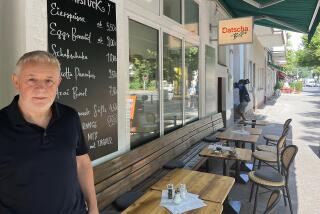Flow of German Emigres Slows to Trickle
- Share via
BONN — The number of East German refugees entering West Germany dropped markedly Wednesday, but the diplomatic argument between East Germany and Hungary remained heated.
In Passau, the main gateway to West Germany in Bavaria, frontier officials said that the flow of refugees has slackened and that most of those who had crossed the border since midnight Sunday had moved out for more permanent lodgings elsewhere in West Germany.
15,000 Expected
The total number of East German refugees reaching West Germany through Hungary and Austria is still expected to reach about 15,000 by the end of the week, Bavarian officials said.
“The situation has quieted down considerably,” declared West German Interior Ministry official Detlef Flotho. “Individual travelers are arriving steadily but no longer in the mass proportions of Monday and early Tuesday.”
In Poland, about 50 East Germans were reported to have occupied the West German Embassy in Warsaw in an effort to join their estimated 12,000 compatriots who have successfully fled to the West through Hungary in the last several days.
And in Prague, Czechoslovakia, about 180 East Germans remained in the West German Embassy--also hoping to join the exodus of refugees that has created a crisis among East Germany, West Germany and Hungary.
West German Chancellor Helmut Kohl turned the refugee crisis to his political advantage Wednesday by urging the annual conference of the Christian Democratic party in Bremen to fight next year’s national election with the kind of drive displayed by the incoming East Germans.
‘Energy and Optimism’
Kohl urged the 750 delegates to emulate the refugees in the election campaign and show the same “energy and optimism.”
In East Berlin, a commentary in the official Communist newspaper, Neues Deutschland, accused West Germany of “interventionist, aggressive acts against East Germany.”
On the other hand, some East German comments seemed purposely toned down.
The Communist youth daily, Junge Welt, ran a statement that said East Germany should openly discuss why so many people are leaving the country “for questionable happiness in the West.”
Other commentators in East Berlin, however, continued to criticize Hungary for breaking the 1969 pact with East Germany that forbids each country to allow the other’s citizens to go to the West.
East Germany, one of the hard-line countries in the Communist Bloc, has resisted the economic and political reforms called for by Soviet President Mikhail S. Gorbachev.
In contrast, Hungary has instituted liberal economic measures to improve living conditions and has increasingly sought financial aid from the democratic states of Western Europe--particularly the Bonn government.
Hands-Off Policy
The Soviet Union has maintained a hands-off policy in the current verbal battle between Hungary and East Germany, analysts say, adding to the anger and frustration of the regime in East Berlin.
And the confusion in East Germany has been compounded by the fact that its leader, Erich Honecker, 77, is seriously ill, reportedly recovering from a gall bladder operation.
He has not been heard from directly since the exodus of East Germans through Hungary and Austria to West Germany began over the weekend.
More to Read
Sign up for Essential California
The most important California stories and recommendations in your inbox every morning.
You may occasionally receive promotional content from the Los Angeles Times.










